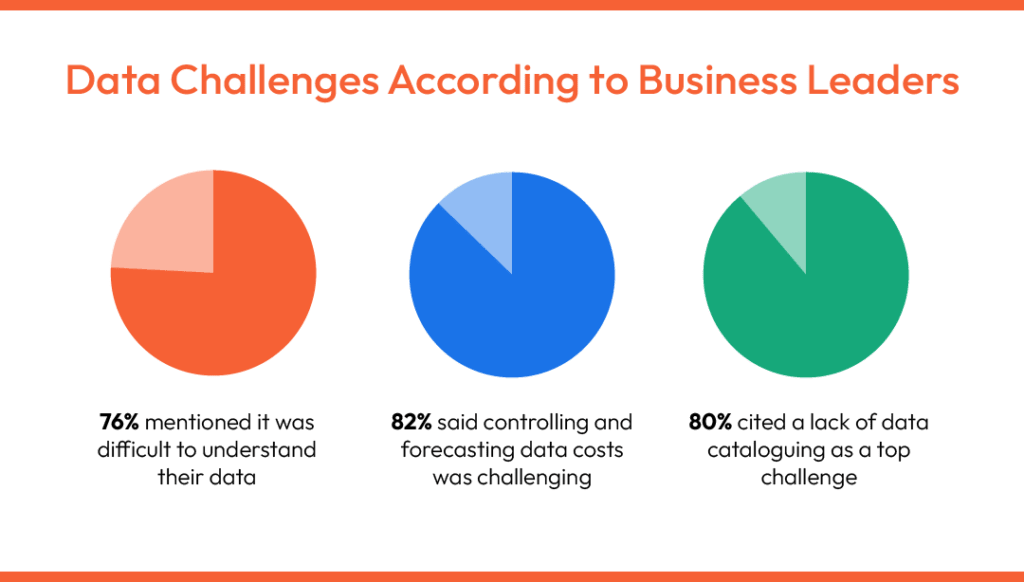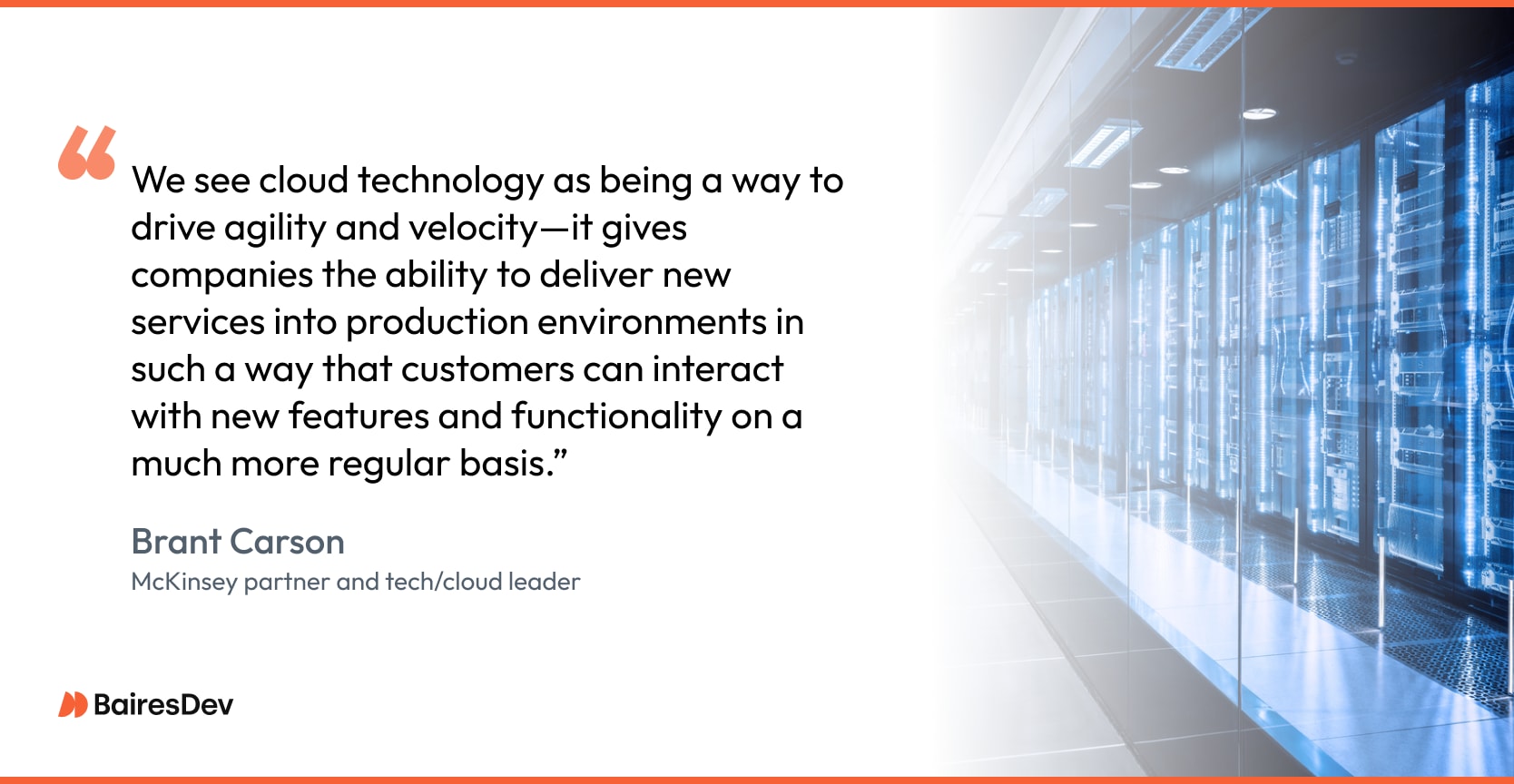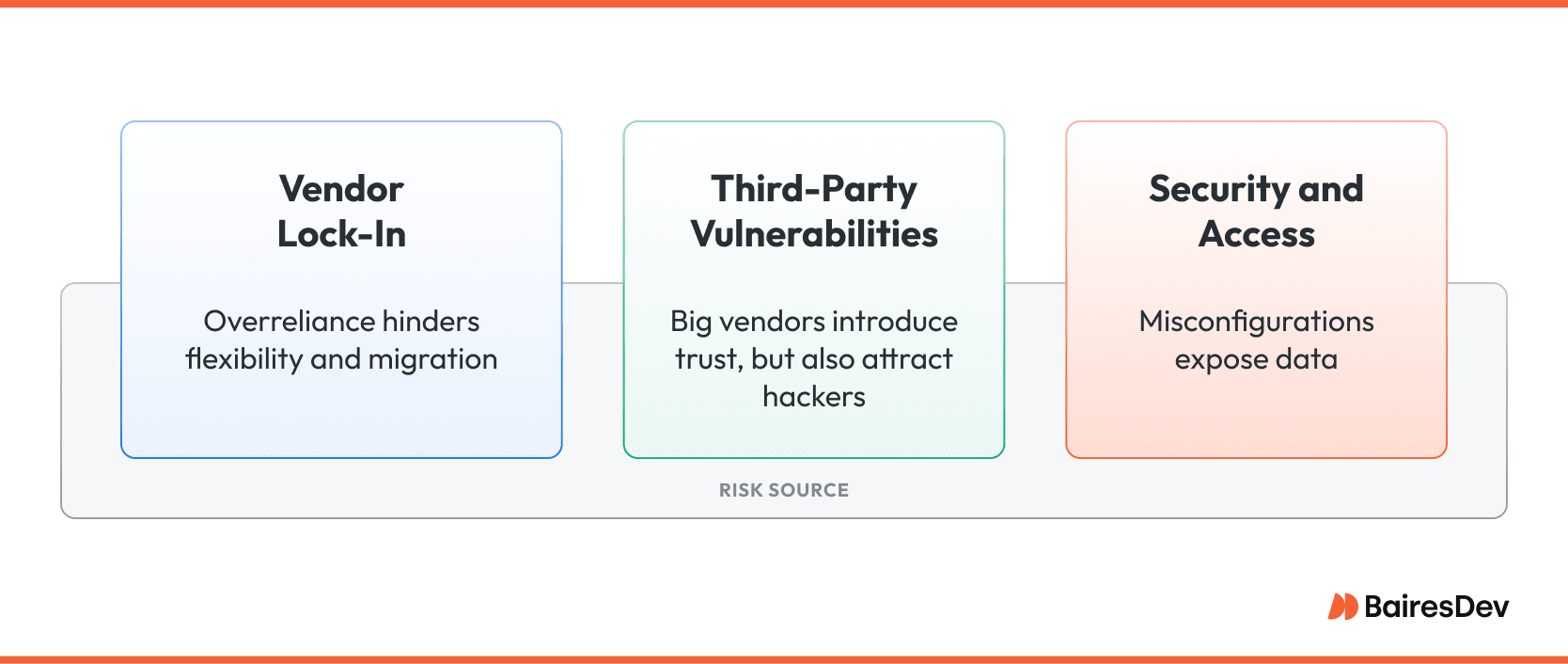As data volumes grow and architectures sprawl across multiple services and teams, cloud data management becomes a liability. Sensitive information lives in too many places. Ownership is unclear. Compliance audits take too long. And when something breaks, nobody knows where the problem originated.
A recent Forbes study found that 76% of business leaders struggle to make sense of their data. Cost forecasting is equally murky, as 82% of data leaders cited it as a challenge, and 80% pointed to lack of talent as a key blocker.

Source: Forbes
The stakes are high. The global data management market is expected to hit $77.6 billion by 2025, yet most organizations still fail to leverage even a fraction of the data they collect. A Harvard Business Review report revealed that less than half of structured data informs decisions, and less than 1% of unstructured data is used at all.
The gap isn’t just a missed opportunity — it’s a risk multiplier. The question is no longer whether your data stack is in the cloud. It’s whether your data strategy can keep up with your roadmap.
Overcoming Traditional Data Infrastructure Bottlenecks
Your in-house data stores might be serving you fine for the moment. However, maintaining a strategic outlook means consistently thinking several steps ahead. A migration might seem daunting at first, but in the end, tackling these challenges will bring business value.
Client Snapshot: Modernizing Legacy Insurance Apps
Let’s look at a recent example of how BairesDev helped a client modernize their data infrastructure.
A leading insurance provider serving over 5 million policies hadn’t updated their quoting app in five years. Their legacy application was riddled with bad code and technical debt. Our team migrated the application to AWS and Kubernetes, improving code standards and management as it moved from on-premises infrastructure to the cloud.
Cloud Providers Offer Built-In Security and Access Control
Most enterprises don’t have dedicated internal teams focused only on data security. Cloud providers do. Industry leaders like AWS and Azure invest a lot in security infrastructure — intrusion detection, patch management, and encryption by default. With centralized IAM policies, role-based access, and audit trails, you can enforce data governance without bottlenecks.
Scaling Efficiently with the Right Foundation
Buying and deploying hardware isn’t scalable. Cloud computing offer elastic resources and usage-based pricing, removing capital expense from the equation. Teams can scale cloud storage or compute on demand, and this is ideal for bursty workloads or rapid growth.
Cloud technology also allows you to control data access and data management processes. You can hire teams from anywhere across the globe, grant them access to the platform, and trust that they will be able to successfully collaborate with other distributed teams and work with your data in the cloud.
Why Your Cloud Data Management Keeps Falling Short
Speed often beats structure in early cloud adoption, but over time, the lack of structure becomes a drag on delivery. Companies that succeed at scale treat cloud data management as infrastructure, not overhead. They invest in platform-level automation and cross-functional alignment between engineering, security, and compliance.
A great strategy doesn’t just protect your data. It keeps your delivery roadmap on track when stakes are high and timelines are tight.
When creating your strategy, ask yourself these questions:
- Will you need a public, private, or hybrid cloud environment?
- Who will need access to the data in the cloud?
- What processing tasks will your data require?
- What type of database will you use?
- What tools do you need for a successful migration?
- Can you migrate data with no downtime?
Now, how do we turn those insights into a strong cloud data management strategy?
Core Components of Effective Cloud Data Management

To stay ahead, your cloud data strategy needs to include:
- Governance built for scale: Define clear ownership, access levels, and approval workflows. Centralize policy enforcement across environments (e.g., AWS, Azure, GCP) using tools like IAM, service control policies, or third-party governance layers.
- Platform alignment: Don’t choose cloud service providers based on features alone. Consider:
- Regulatory fit (HIPAA, SOC 2, GDPR)
- Cloud integration with your existing analytics and ETL stack
- Cost predictability under heavy data movement or storage
- Lifecycle planning: Data should be tagged, categorized, and retired systematically. Automate classification and archival where possible — especially in high-volume environments like real-time telemetry, clickstream, or IoT pipelines.
- Resilience and recoverability: Your strategy isn’t complete until you can answer: What happens if we lose access to this dataset tomorrow? Build redundancy, versioning, and disaster recovery into your storage and access plans from the start.
Simplifying Data Integration with the Cloud Data Management
Cloud data integration gives organizations a practical way to bring together data from different systems and formats into one clear, connected view.
Data is everywhere: spread across old systems, SaaS tools, and isolated databases. Data management takes more than just storing it; it requires a clear and connected integration strategy. With the power and flexibility of cloud computing, teams can handle large volumes of data without running into infrastructure bottlenecks.
For engineering leaders who need to deliver faster insights and executive reporting, this means fewer blind spots. Cloud-based data platforms break down silos, make analysis easier, and enable real-time access to improved data quality at scale, without putting extra pressure on internal teams.

Customer Data Protection in the Cloud
When engineering teams are under pressure to scale quickly, weak or outdated data infrastructure can become a serious drag on delivery timelines, delaying projects and increasing time to market. It also complicates headcount planning, as teams spend more time firefighting data issues rather than focusing on innovation.
On top of that, poor data management raises the risk of compliance violations, which can lead to huge fines and reputational damage.
That’s why investing in scalable, reliable data infrastructure isn’t just a technical priority. It’s critical for protecting your business.
Optimizing Data Management to Support Business Goals and Efficient Strategy
For CIOs navigating complex IT landscapes, a cloud data management strategy isn’t just about modernization—it’s about building an infrastructure that can keep pace with the business. As data volumes grow and systems become more distributed, the risk of fragmentation, latency, and inconsistent access increases.
Cloud platforms offer a way to consolidate data architecture, improve visibility, and enforce consistent governance across the organization. Features like policy-driven automation, real-time replication, and scalable storage aren’t just nice to have—they’re essential for reducing manual overhead and improving system resilience.
Future-Proof Your IT: Efficiency, Backup Integrity, and Recovery Planning
Most cloud platforms make backup and recovery both simpler and more reliable. Disaster recovery is built in, reducing risk from hardware failures or unexpected outages. Many platforms also support automated data backups, giving you full control and an added layer of resilience.
Cloud-based architectures also streamline data hygiene. By consolidating sources and enforcing a single source of truth, they reduce duplication, improve accuracy, and keep data continuously up to date. That level of consistency is essential if you’re planning to use your data for analytics, AI, or integration with external systems.
If your company is concerned about keeping its carbon footprint down, migrating to a cloud data management platform can go a long way. Unlike traditional local data storage, which often involves significant energy consumption and inefficiencies, cloud data management systems are designed to be more environmentally friendly.
Data Governance to Protect Sensitive Data
You must develop a solid data governance policy, emphasizing the importance of data management services in managing data across hybrid and multi-cloud infrastructures. It’s important to fully understand any and all compliance issues related to your data and to make sure you are always in compliance.
Risks Involved in Modern Cloud Data Management
Sound cloud data management comes with real upside, but it’s not without risk. Security is the biggest concern. Even with strong tools from cloud providers, missteps like exposed buckets or lax access controls can lead to costly breaches. The cloud shifts responsibility for infrastructure, but data protection is still on you.

Third-Party Access
Even with all of the advantages, some businesses don’t like the idea of hosting their data on a third-party service. Always evaluate the certifications of a cloud vendor to address security challenges. Although the chances are slim that someone within a cloud data management vendor will use your data against you, it is still a risk.
Vulnerability to Attacks
Hackers know that cloud storage offers a veritable treasure trove of information, so they are always looking for new ways to infiltrate those systems.
That doesn’t mean they will succeed, but it does mean they are regularly under attack. If attackers find a zero-day exploit, your team may have to act immediately.
Data Management Best Practices
Vendor Lock-In
Vendor lock-in can become a serious issue. Cloud-native tools speed things up, but they can make migration and repatriation difficult. If your systems lean too heavily on one provider, switching or scaling elsewhere can get expensive fast. Experienced CTOs plan for flexibility from the start.
This can be especially problematic if your team built custom solutions. If the new cloud data management provider doesn’t have APIs to connect those custom services, you could find yourself at a disadvantage.
Future of Cloud Data Management Solutions
What’s next for cloud data management? The future will likely be shaped by emerging trends such as AI, edge computing, hybrid cloud solutions, and the Internet of Things (IoT).
With growing volumes of raw data and increasing reliance on real-time analytics, businesses need smarter, future-proof data strategies. Making the move from an on-prem database to the cloud isn’t always straightforward, nor is it viable for many organizations.
If your team is overcommitted and your data infrastructure is slowing delivery, BairesDev can help. We’ve supported Fortune 500 engineering orgs through complex cloud transitions without derailing roadmaps.
Frequently Asked Questions
What steps can we take to avoid vendor lock-in with our cloud data strategy?
Vendor lock-in becomes a risk when systems rely too heavily on proprietary cloud services. To mitigate this, we recommend designing for portability: use open standards, abstract service layers where possible, and prioritize providers with strong multi-cloud or hybrid support.
What’s the typical timeline for migrating enterprise data to the cloud?
Migrating enterprise data to the cloud typically takes 6 to 18 months range, depending on scale and complexity, though smaller migrations can wrap up in as little as 2–4 months.
How do you maintain compliance (e.g., HIPAA, GDPR) during a cloud transition?
Staying compliant during a cloud transition means addressing regulatory requirements from the start, not after the fact. This includes mapping where sensitive data resides, applying appropriate encryption and access controls, and ensuring data residency and retention policies align with relevant laws. Continuous monitoring, audit trails, and collaboration between security, legal, and engineering teams are key to avoiding gaps during and after migration.
How do we ensure data governance across distributed teams and multi-cloud environments?
In environments that span public and private clouds, governance starts with visibility and control. Use centralized identity and access management (IAM) to enforce consistent permissions across platforms. Implement policy-based automation to standardize data handling, tagging, and lifecycle management. For distributed teams, clear ownership structures and audit-ready logging are essential to maintain accountability without creating bottlenecks.
Can BairesDev integrate with our internal DevOps and security processes?
Yes, BairesDev specialists integrate directly with your internal DevOps, security, and governance processes, without creating silos or duplicate effort. That’s a core part of how we support large-scale enterprise clients.






